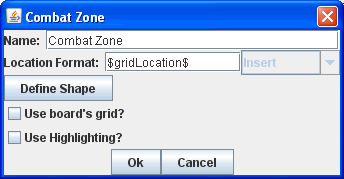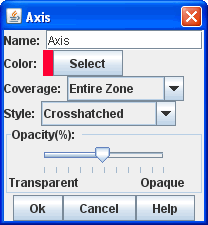VASSAL Reference Manual
Home > Module > Map > Board > Multi-zoned GridMulti-zoned Grid
A multi-zoned grid allows you to define any number of sub-regions of a board. Each sub-region, called a Zone, can have its own grid and naming format, which takes precedence over the default grid. For example a board with a hex grid may have zones along the edge for a turn track or force pools. Pieces will snap to positions in the appropriate zone and auto-reporting will use text supplied by the zone.Sub-Components
Zone
| Each zone can have an arbitrary shape,
which you specify in the Define Shape
dialog. Each zone may define its own grid. When defining a
zone's grid, the offsets and numbering are relative to the edge of the
overall board, not the zone's edge. A Zone may contain Properties. Zone Properties may not have a Change-Property Toolbar Button, but can be modified by a Set Global Property Game Piece trait Name: The name of the zone. Location Format: A Message Format that will be used to define the location of a point for auto-reporting of moves: name is the name of this Zone, gridLocation is the location name according to this zone's grid. Define Shape: Hit this button to bring up a dialog for defining the shape of this zone. To create the initial shape, drag the mouse to define a rectangle. Then right-click to add new points and use the mouse to drag points to their final locations. Delete a point by clicking on it and hitting the DEL key. Use board's grid: If selected, then this Zone will use the grid from the containing board instead of defining its own grid. Use Highlighting: If selected, you must also specify the name of a Property. The value of the property will determine which Zone Highlighter is used to draw the zone. |
 |
Zone Highlighter
| Any number of Zone Highlighters can be
added to a Multi-Zone grid. Any Zone whose highlighting property
matches the name of a Zone Highlighter will be drawn with that
highlighter, which overlays a colored pattern over the shape of the
Zone. Name: The name of the highlighter. Color: The color of the highlight. Coverage: Select Entire Zone to overlay the entire shape of the zone. Select Zone Border to overlay only the border of the Zone. Style: Select from solid color, striped diagonal lines, crosshatched diagonal lines, or an image that you specify. Opacity: Select the transparency of the overlaid color or image. |
 |
If a given point does not fall within any of the defines Zones for a Multi-zone grid, the default grid is used. The default grid may be any of the usual types of grid: